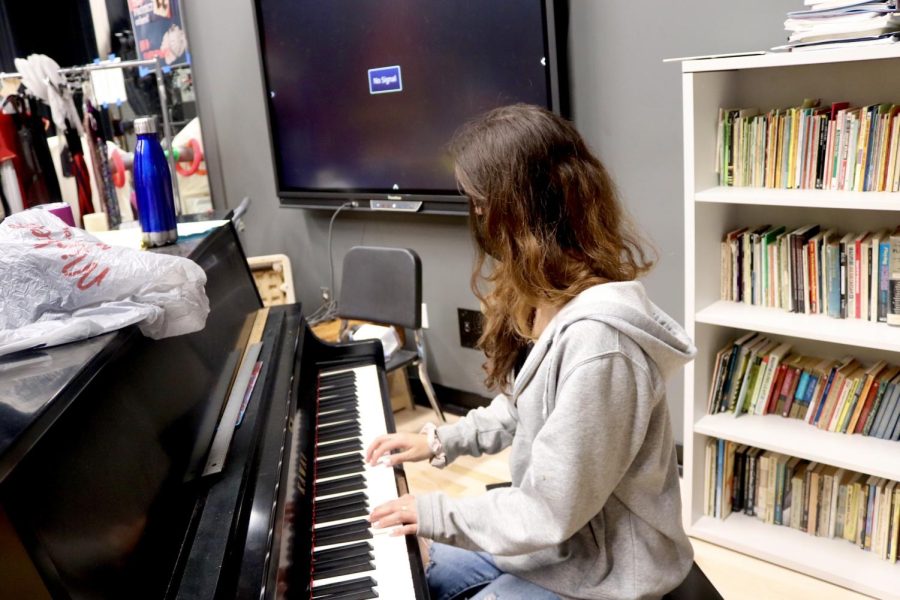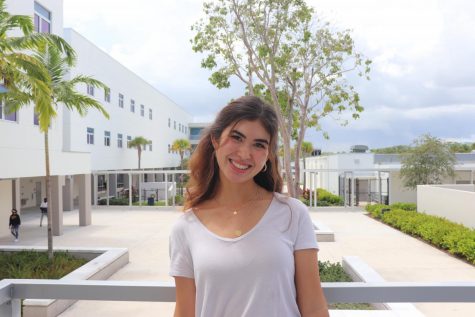How Playing an Instrument Changed My Life
Senior Copy Editor Katriona Page demonstrates playing the piano.
March 10, 2022
I was seven years old when my mother first introduced me to the piano. She had played growing up and thought it was important for her children to also learn an instrument. If I didn’t take to piano, that was fine: my mother made it clear that I could try the guitar or drums or piccolo instead.
Fortunately, I did like it. I attribute this in large part to my teacher, Ms. Kim, whom I adored. She was young and pretty and had aspirations of being a concert pianist. She struck the right balance between setting high expectations and never pushing too hard. This kept piano fun; it made practice enjoyable rather than tedious, leisure rather than chore. Her teaching even compensated for my hyperhidrosis, or excessive sweating of the palms. This condition sometimes made playing difficult, as my hands would spontaneously start sweating.
Every week, Ms. Kim gave me a sheet of stickers and a piece of paper listing scales and pieces in progress. On the paper was a tree, and every day I practiced, I put a sticker on my tree. For three or four years, my tree was always full, the shimmering blue and yellow smiley faces reminding me of the amount of effort and time I had put into learning the piano. For three or four years, I made steady progress, advancing from early beginner to late beginner to intermediate.
During this time, I had been playing in recitals. I vividly remember just how nervous I felt for the first one – my sweaty, puffy red hands desperately miming the notes for “Green Grow the Lilacs,” my legs visibly shaking as I walked across the stage of the local university’s small theater. I wish I could say my nerves subsided over the years, but for me, every recital was an equally terrifying, sweat-inducing and heart-thumping affair that I agonized over for weeks in advance.
In 2015, Ms. Kim told me she was leaving for California. That year, my worst fear also came true: my stage fright got the best of me and at a recital, I forgot a piece I had spent months memorizing. After countless false starts, I had to walk off stage and grab my sheet music, avoiding the eyes of both my grandmothers – one of whom had traveled from England – and my mother’s best friend, who had traveled from D.C.
The experience was discouraging. It was the first time my work had not paid off. Up until that point, in all areas of my life, from music to sports to academics, I could always see the results of the effort I put in. At the same time, after Ms. Kim’s departure, I plateaued. At the time, I blamed it on my new teacher but I think it was also a natural progression – as I got better, I couldn’t expect to keep improving at the same rate. Simultaneously, my hyperhidrosis continued to worsen, making it increasingly more difficult to practice. Regardless of the cause, I was less motivated, and my sticker tree became sparse.
This period of apathy was temporary and eventually, I returned to practicing consistently. I joined my school’s orchestra, continued to play in recitals and entered piano competitions. However, it taught me an important, if obvious lesson: I’m not entitled to the outcome I want simply because I put in effort, but regardless, it is essential to keep trying. I’ve since quit piano, but keeping this lesson in mind has motivated and encouraged me in all areas of my life.










